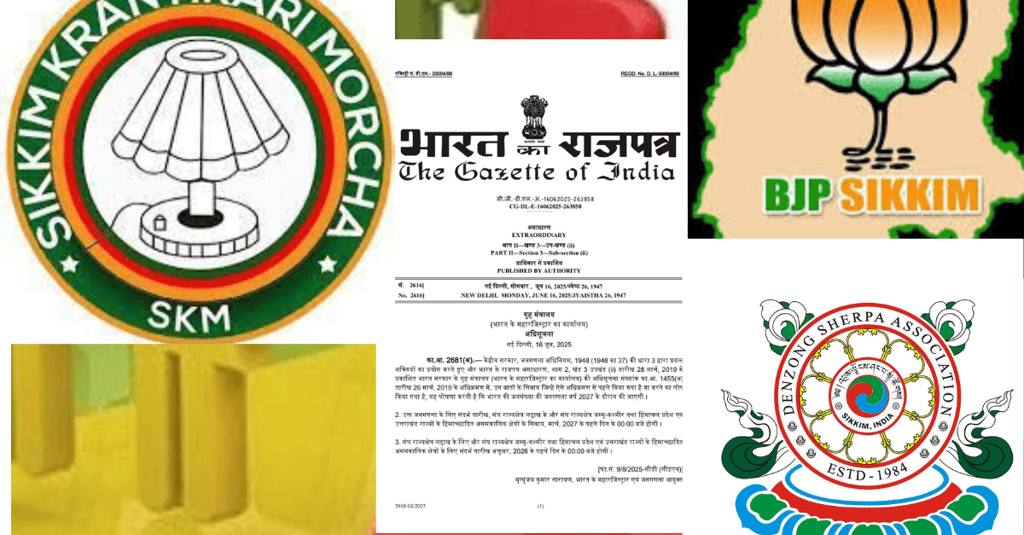Sikkim leaders, political parties applaud 2027 census announcement, calls grow for full public participation
The association expressed hope that the 2027 Census would finally help document the Sherpas as a distinct community, allowing accurate collection of data related to education, livelihood, culture, and language.
LOCAL


The Central Government’s announcement to conduct the long-awaited population census in 2027 has been widely welcomed in Sikkim by political parties and community associations alike. The Gazette notification, issued by the Ministry of Home Affairs on June 16, 2025 (S.O. 2681(E)), declares that the decennial Census of India will be held in 2027, with special reference dates for snow-bound areas like Ladakh, Jammu & Kashmir, Himachal Pradesh and Uttarakhand.
For most parts of India, including Sikkim, the reference date for the Census will be midnight of March 1, 2027. This marks the first census after a 16-year gap, as the 2021 enumeration was postponed due to the COVID-19 pandemic.
The Sikkim Krantikari Morcha (SKM) party has strongly endorsed the decision, calling it timely and vital. In a press statement, SKM spokesperson Bikash Basnet praised the move as a step toward accurate governance and said the party would fully cooperate in ensuring that all residents are properly counted. “The Census is not just a headcount; it is the foundation of planning for schools, hospitals, roads, and other welfare services,” he said.
SKM credited Prime Minister Narendra Modi’s leadership for giving importance to data-driven governance and promised that the state government, under the leadership of Chief Minister Prem Singh Tamang (Golay), would do everything necessary to ensure smooth enumeration across urban, rural, and remote areas of the state.
The party also said it would launch awareness campaigns at the grassroots level to educate people about the importance of their participation. “No one should be left behind. Every person must be counted so that development benefits reach all corners of Sikkim,” the statement said.
Joining SKM in supporting the census initiative, the Bharatiya Janata Party (BJP), Sikkim Pradesh, also issued a press release welcoming the inclusion of caste-based enumeration as part of the 2027 Census. Calling it a “bold and progressive” step, BJP Sikkim described the decision as a landmark in India’s move towards inclusive and just governance.
According to the BJP, accurate caste-wise data will empower policymakers to design better schemes for historically marginalized communities. “This will make reservation policies fairer and allow government benefits to reach the truly deserving,” the statement read. The party also said that this data would help in crafting state-specific welfare initiatives, especially in demographically unique regions like Sikkim.
The BJP highlighted four key benefits of the caste-based census: evidence-based policymaking, fairer reservations, empowerment of marginalized groups, and greater transparency in governance.
Meanwhile, the Denzong Sherpa Association also voiced strong support for the upcoming Census. The association described the Gazette notification as a “historic and necessary exercise” and thanked Prime Minister Modi and Home Minister Amit Shah for giving importance to inclusion and recognition of smaller communities like the Sherpas.
Association President Sangay Sherpa said that the Sherpa community has long remained statistically invisible, as it has often been grouped under broader ethnic classifications. “This has led to policy neglect, lack of representation, and failure in accessing specific benefits meant for minority groups,” he noted.
The association expressed hope that the 2027 Census would finally help document the Sherpas as a distinct community, allowing accurate collection of data related to education, livelihood, culture, and language. “It is a moment of assertion for our community,” the association stated.
An appeal was also made by the Denzong Sherpa Association for active participation by every Sherpa household during the Census. “Let us make sure our voices are recorded with dignity and accuracy,” said the statement, urging both young and elderly members to cooperate with officials during the exercise.
The upcoming Census will not only gather demographic data but will also include updated information on housing, literacy, employment, access to services and economic conditions. With this new layer of information, the government aims to better assess development gaps and enhance targeted interventions.
